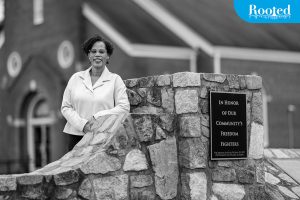Karla Slocum has been contributing to research at Carolina for 27 years.

Karla Slocum has worked for UNC-Chapel Hill for 27 years in a variety of roles, most recently as senior associate dean for diversity, equity, and inclusion (DEI) for the UNC College of Arts and Sciences. She is also a professor of anthropology and the Thomas Willis Lambeth Distinguished Chair in Public Policy.
What brought you to Carolina?
A predoctoral fellowship. I was a graduate student at the University of Florida, working on a dissertation that examined how African and Asian-descended farmers in the Caribbean responded to the impending loss of market access for their primary export crop. One of my doctoral committee members encouraged me to apply for a fellowship on racial and ethnic economic inequality at UNC-Chapel Hill. I was shocked and excited to receive it. There were two other fellows, and for a year, we met weekly in a vibrant seminar with several speakers who are well-known academics. The experience gave me time to complete my dissertation and allowed me to connect with the anthropology department, where I eventually became a faculty member.
How has your role here changed over the years?
I’ve had many roles from predoctoral fellow, to postdoctoral researcher, to faculty member, to administrator. I was a Carolina Postdoctoral Program for Faculty Diversity fellow for two years, and then I joined the faculty with a joint tenure-track appointment in anthropology and African, African American, and diaspora studies. As a faculty member, I focus my research and teaching largely around race, Black communities, rural lifeways amid economic change, and the meanings people attach to a place or community.
I first got my feet wet with administrative work when I was still a junior faculty member and co-directed the Moore Undergraduate Research Apprentice Program, which prepares undergraduates for future careers as faculty who are committed to diversity in the academy. In 2013, I became director of the Institute of African American Research (IAAR), where I supported faculty, student, and community-engaged research, research-informed teaching, and research skill development for work that focuses on people of African descent or race.
Now, I’m leading DEI for the College, and I think this work builds on dimensions of my other two administrative roles. People don’t often think about DEI in connection to research, but I have tried to leverage my administrative support of research on race and diversity into the work I now do, building a framework to advance inclusion and equity in the humanities, arts, social sciences, and sciences.
What’s kept you at Carolina?
This is not a complacent campus. The way the community engages in activism — especially around the social health of the campus — is a virtue. I appreciate that energy and don’t take it for granted because I know it’s not found everywhere.
What contribution are you most proud of?
Overall, I’m pleased when the work I do has a clear and meaningful impact. At times, my research has been disseminated beyond the academy and helped change public perceptions of the value and experiences of Black communities. In the courses I teach, I‘ve developed content and instructional strategies that motivate students to deeply immerse themselves and form strong connections with classmates. I have also helped foster community partnerships based on respect and mutual participation. Recently, someone emailed me to say that my DEI work has helped them feel like they can call Carolina their home. That made my day!
What is a uniquely Carolina experience you’ve had?
When I was director of IAAR, I co-chaired an event called “Black Communities: A Conference for Collaboration” as part of a joint effort with the Kenan Institute of Private Enterprise. Along the way, we joined with University Libraries, the Center for the Study of the American South, and Humanities for the Public Good. We also had support from more than 10 other units across the university over the course of the conference’s existence. It’s true that, sometimes, our work at Carolina becomes siloed and we are unaware of existing efforts on campus that resonate with our own. But I’ve also found some incredibly collaborative endeavors here. It’s such a large institution that the possibilities for connections are extensive.
Rooted recognizes long-standing members of the UNC-Chapel Hill community who have aided in the advancement of research by staying at Carolina. They are crucial to the UNC Research enterprise, experts in their fields, and loyal Tar Heels. Know someone we should feature? Nominate a researcher.
